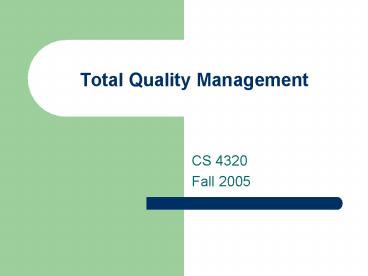Total Quality Management - PowerPoint PPT Presentation
1 / 31
Title:
Total Quality Management
Description:
Total Quality Management. CS 4320. Fall 2005. Keep in Mind ... Total Quality Management. TQM. 100 % Customer Satisfaction. Meeting Customer Expectations ... – PowerPoint PPT presentation
Number of Views:1062
Avg rating:3.0/5.0
Title: Total Quality Management
1
Total Quality Management
- CS 4320
- Fall 2005
2
(No Transcript)
3
Keep in Mind
- Can this be applied to Software Engineering?
- Under what circumstances?
- The bottom line
- Think like a business person, not just a SE
- Does this impact profit
- short-term, long-term
- Cost-benefit
- Positive, Negative
- Return-on-investment (ROI)
4
In the Beginning
5
What happened?
American Industry Focus on dividends,
short-term profit, PE ratio,
complacency
W. Edwards Deming Focus on process and quality
first
6
(No Transcript)
7
American Industry Model
Efficiently Manufacture Product
8
The Deming Chain Reaction
Improve Quality
Productivity Improves
Costs Decrease
Capture Market With better Quality goods services
Provide Jobs and dividends
Stay in business
How does this apply to SE?
9
How then do we improve quality?
- By everyone doing their best?
No Chaos!!!!!!
- Upper Management Commitment
- Better Technology
- The Whip!!!
Know what to do, where you fit in, then do your
best in well-led team.
10
The 14 Points (1-6)
- Create constancy of purpose (today vs. future)
- Adopt the new philosophy
- Cease dependence on mass inspection
- Dont award business on price alone
- Improve constantly (continuous process
improvement) (Not putting out fires) - Institute training and retraining in job
11
The 14 Points (7 - 14)
- Institute leadership
- Manage things, Lead people
- Failing organizations are usually over-managed
and under-led - Drive out fear (Shoot the messenger)
- Break down barriers between areas
(Cross-Functional Teams) - Eliminate slogans and exhortations (Zero
Defects) - Eliminate production quotas
- Remove barriers to the pride of workmanship
- Institute vigorous program of education in
quality - Take action to accomplish the transformation
12
The Seven Deadly Diseases
- Lack of constancy of purpose
- Emphasis on short-term profits
- Evaluation by annual review, performance
- Mobility of management
- Manage by visible figures alone
- Excessive medical costs (US Only)
- Excessive costs of warranty (US Only)
13
Total Quality Management
TQM
Continuous Process Improvement
Statistical Process Control
100 Customer Satisfaction Meeting Customer
Expectations
14
What is Quality?
15
How much quality? 99.9?
- 2 mill docs a year lost by IRS
- 22K checks deducted from wrong acct each hr
- 12 babies given to wrong parents each day
- 2 unsafe landings a day at ATL
- 107 incorrect medical procedures each day
16
How much?
Deming Quality does not mean achieving
perfection. It means the efficient production of
the quality that the market expects.
If quality is what the customer says it iswho
then is our customer?
17
What is a process?
18
Continuous Process Improvement
- Incremental rather than big-bang
- Contrast with Paradigm Shifts, BPR
- Made using data
- Treat root causes not symptoms
- Workers know best how to do a process
- Avoid consultants adapt current work practices
19
CPI Model Shewart Cycle
Plan
Act
Do
Check
20
PLAN
- Identify Problem
- Describe the process flow
- Identify Possible Causes
- Is process in control (repeatable?)
21
DO
- Determine what changes might help
- Select and implement a change on pilot project
22
CHECK
- Measure effects of change
- Determine whether improvement exists
23
ACT
- If improvement, adopt across organization
- Continue cycle by entering Plan
24
The Dilbert Cycle
ACT
Blame someone Else for catastrophe
Make wild guess At what is wrong
Adopt unproven Process or technology
25
What makes CPI Hard??
- Cause-Effect not obvious
- Organizations are complex systems
- Organizational Structure itself resists change
26
Shifting the Burden
Symptomatic Solution
Side Effect
Problem Symptom
DELAY
Fundamental Solution
27
Laws of Process Improvement
- Todays problems come from yesterdays solutions
- The harder you push, the harder the system pushes
back - Behavior grows better before it grows worse
- The easy way out usually leads back in
- The cure can be worse than the disease
28
Laws of Process Improvement
- Faster is slower
- Cause and Effect are not closely related in time
and space - Small changes can produce big results, but the
areas of highest leverage are the least obvious - You can have your cake and eat it too, but not at
once - Dividing an elephant in half does not produce two
small elephants - There is no blame
29
CPI vs. Reengineering
- One of degree
- Radical change of a process as opposed to
incremental - AKA Reinventing, Paradigm-Shifting
- Process-Centered Organizations
- Manager as process-owner
30
The Red Bead Experiment
31
Next Time
- Statistical Process Control































